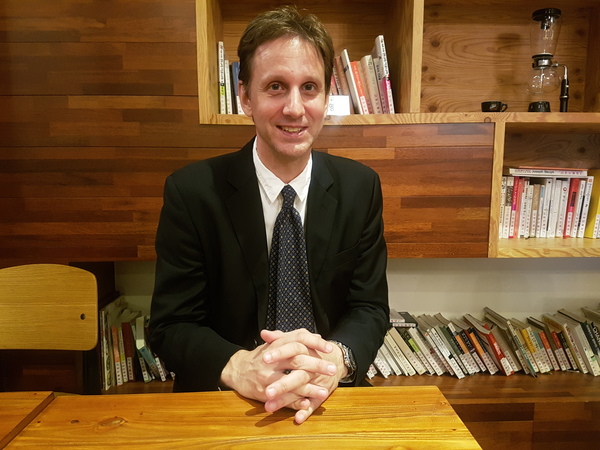 |
|
Asia Desk Director for the International Federation for Human Rights (FIDH) Andrea Giorgetta
|
FIDH Asia desk director Andrea Giorgetta says right to assembly not always guaranteed
“Only peaceful assemblies are protected by the constitutional freedom of assembly and demonstration. Individuals may not express their viewpoint through violence.” – the prosecutor “The object of assembly is to make an appeal to someone. What sort of country would set up illegal vehicle barricades and chase demonstrators the way hounds chase the hares?” – the defense attorney On the afternoon of June 12, the jury trial for Lee Young-ju, former secretary-general for the Korean Confederation of Trade Unions (KCTU), began in Criminal Courtroom No. 417 at the Seoul Central District Court in the Seocho neighborhood. Lee was charged with organizing 10 illegal assemblies, including the “nationwide rally” in 2015. The prosecutor and defense attorney locked horns in the age-old debate in South Korean society over assembles and demonstrations, using terms such as “illegal,” “vehicle barricades” and “violence.” One person attending the attorneys’ arguments was Andrea Giorgetta, 45, Asia Desk Director for the International Federation for Human Rights (FIDH), who was sitting in the gallery with an interpreter. Giorgetta, whose job is monitoring human rights abuses in more than 20 Asian countries and working to correct those abuses, visited South Korea from Bangkok, the site of FIDH’s Asian office, to observe Lee Young-ju’s trial. FIDH has formed partnerships with 184 civic groups in 120 countries around the world. When former KCTU president Han Sang-gyun was jailed after the nationwide rally (Han was recently released on parole), the FIDH filed a petition to the UN Human Rights Council (UNHRC), denouncing the act as an “arbitrary detention.” Last year, the Working Group on Arbitrary Detention with the Office of the UN High Commissioner for Human Rights (OHCHR) concluded that Han’s imprisonment constituted an arbitrary detention, which is a violation of the UN’s human rights charter, and recommended that Seoul release him. Giorgetta not only attended Lee’s trial, which took place for two days, on June 11 and 12, but was also in the courtroom on June 14 when Lee was sentenced to three years in prison, suspended for four years, and was fined 500,000 won (US$450), a sentence which was also suspended. “The mood in the courthouse has changed. I could see how the attitude toward assemblies and demonstrations has changed since the candlelit rallies,” Giorgetta said, noting the difference between this verdict and Han’s trial, which ended in Dec. 2015 with Han going to prison. The prosecutors argued that measures such as banning assemblies and setting up vehicle barricades had been taken for the safety of assembly participants and passersby. “The prosecutors’ arguments make it sound like the ease of traffic has a higher priority than the rights of assembly and demonstration. That assumption is far removed from international human rights standards,” Giorgetta said. Even though assemblies are a basic right guaranteed by the constitution, this right is not protected in reality, he said, pointing out that organizers must ask the authorities for permission to assemble. Even though assemblies are allowed in principle as long as the authorities are notified in advance, that is undermined by the fact that the police can ban an assembly on a whim, Giorgetta pointed out. While a farmer named Baek Nam-gi was put in a coma and eventually died after being directly hit by a police-operated water cannon in Nov. 2015, the prosecutors contended that the police actions had been lawful. They repeatedly showed the jury a video containing violent actions by some of the demonstrators. Not always right to hold leaders responsible for criminal actions of individual protesters “When a large-scale demonstration is held, it is very likely that unexpected situations will occur. It’s not right to always hold the organizers criminally responsible for the actions of individual protesters,” Giorgetta said. “This has repeatedly been used as an excuse to bring criminal charges against labor organizers.” The questions by the jury--who ultimately decided to hand Lee a suspended sentence – started from a different perspective than the prosecutors. They asked many basic questions, such as whether the freedom of assembly and demonstration had been completely guaranteed and what factors enable peaceful demonstrations. “There was violence during the nationwide rally in 2015, but the candlelit rallies were conducted peacefully in 2016. Where did that difference arise?” one juror asked. “Were vehicle barricades also set up during the candlelit rallies in 2016?” another asked. During the jury’s deliberations, which lasted for more than four hours, all seven of the jurors found Lee guilty, but an absolute majority – six out of those seven – opted to suspend her sentence. “The remarks by the jurors, the judge and the prosecutors were all based in the sense that things changed between 2015 and 2016. A political change has been noticeable since the candlelit rallies, and everyone participating in this trial was conscious of that change. Social change is what made this suspended sentence possible,” Giorgetta said. Lee was released from Seoul Jail, located in Uiwang, Gyeonggi Province, on June 14. That same afternoon, Giorgetta returned to Bangkok. After leaving the courtroom, Giorgetta smiled and said, “We’ll be watching to see whether the prosecutors appeal. By Ko Han-sol, staff reporter Please direct comments or questions to [english@hani.co.kr]






